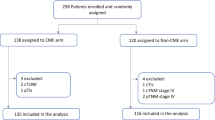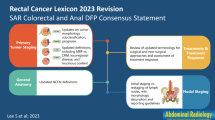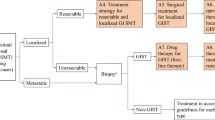Abstract
Purpose
Anorectal gastrointestinal stromal tumors (GISTs) are exceedingly rare, and management remains controversial in regard to local resection (LR) and preoperative chemotherapy.
Methods
The National Cancer Data Base was queried from 1998 to 2012 for cases of GIST resection in the rectum or anus. Patient demographics, type of surgery (LR vs. radical excision [RE]), short-term outcomes, and overall survival (OS) were analyzed. Preoperative chemotherapy was recorded following the US FDA approval of imatinib in 2002.
Results
Overall, 333 patients with resection of anorectal GISTs were included. Mean age at presentation was 62.3 years (range 22–90), and median tumor size was 4.0 cm (interquartile range 2.2–7.0). Five-year OS for all patients was 77.6%. In a multivariable survival analysis, only age and tumor size >5 cm (hazard ratio 2.48, 95% confidence interval 1.50–4.01; p = 0.004) were associated with increased mortality. One hundred and sixty-three (49.0%) patients underwent LR, compared with 158 (47.4%) who underwent RE. For tumors smaller than 5 cm, no difference in 5-year survival by surgical approach was observed (LR 82.3% vs. RE 82.6%; p = 0.71). Fifty-nine patients (17.7%) received preoperative chemotherapy; for patients undergoing RE with tumors >5 cm, there was decreased mortality in the group who received preoperative chemotherapy (5-year OS with chemotherapy 79.2% vs. no chemotherapy 51.2%; p = 0.03).
Conclusions
Size is the most important determinant in survival following resection. Local excision is common, with resection split between LR and RE. For smaller tumors, LR may be adequate therapy. Preoperative chemotherapy may result in improved survival for large tumors treated with radical resection, but the data are imperfect.


Similar content being viewed by others
References
Perez EA, Livingstone AS, Franceschi D, et al. Current incidence and outcomes of gastrointestinal mesenchymal tumors including gastrointestinal stromal tumors. J Am Coll Surg. 2006;202(4):623–9.
DeMatteo RP, Lewis JJ, Leung D, Mudan SS, Woodruff JM, Brennan MF. Two hundred gastrointestinal stromal tumors: recurrence patterns and prognostic factors for survival. Ann Surg. 2000;231(1):51–8.
Miettinen M, Lasota J. Gastrointestinal stromal tumors: definition, clinical, histological, immunohistochemical, and molecular genetic features and differential diagnosis. Virchows Arch. 2001;438(1):1–12.
Scarpa M, Bertin M, Ruffolo C, Polese L, D’Amico DF, Angriman I. A systematic review on the clinical diagnosis of gastrointestinal stromal tumors. J Surg Oncol. 2008;98(5):384–92.
Kukar M, Kapil A, Papenfuss W, Groman A, Grobmyer SR, Hochwald SN. Gastrointestinal stromal tumors (GISTs) at uncommon locations: a large population based analysis. J Surg Oncol. 2015;111(6):696–701.
Jakob J, Mussi C, Ronellenfitsch U, et al. Gastrointestinal stromal tumor of the rectum: Results of surgical and multimodality therapy in the era of imatinib. Ann Surg Oncol. 2013;20(2):586–52.
Xiao CC, Zhang S, Wang MH, et al. Clinicopathological features and prognostic factors of rectal gastrointestinal stromal tumors. J Gastrointest Surg. 2013;17(4):793–8.
ESMO/European Sarcoma Network Working Group. Gastrointestinal stromal tumours: ESMO clinical practice guidelines for diagnosis, treatment and follow-up. Ann Oncol. 2014;25(3):321–6.
Demetri GD, von Mehren M, Antonescu CR, et al. NCCN task force report: update on the management of patients with gastrointestinal stromal tumors. J Natl Compr Canc Netw. 2010;8(2):S1–41; quiz S42–4.
Blesius A, Cassier PA, Bertucci F, et al. Neoadjuvant imatinib in patients with locally advanced non metastatic GIST in the prospective BFR14 trial. BMC Cancer. 2011;11:72-2407-11-72.
Winchester DP, Stewart AK, Phillips JL, Ward EE. The National Cancer Data Base: past, present, and future. Ann Surg Oncol. 2010;17(1):4–7.
Bilimoria KY, Stewart AK, Winchester DP, Ko CY. The National Cancer Data Base: a powerful initiative to improve cancer care in the United States. Ann Surg Oncol. 2008;15(3):683–90.
Miettinen M, Lasota J. Gastrointestinal stromal tumors: pathology and prognosis at different sites. Semin Diagn Pathol. 2006;23(2):70–83.
National Cancer Data Base-Data Dictionary PUF (2014). Charlson/Deyo Score. Available at: http://ncdbpuf.facs.org/content/charlsondeyo-comorbidity-index. Accessed 15 Aug 2016.
Xiao CC, Zhang S, Wang MH, et al. Clinicopathological features and prognostic factors of rectal gastrointestinal stromal tumors. J Gastrointest Surg. 2013;17(4):793–8.
Wilkinson MJ, Fitzgerald JE, Strauss DC, et al. Surgical treatment of gastrointestinal stromal tumour of the rectum in the era of imatinib. Br J Surg. 2015;102(8):965–71.
Gronchi A, Fiore M, Miselli F, et al. Surgery of residual disease following molecular-targeted therapy with imatinib mesylate in advanced/metastatic GIST. Ann Surg. 2007;245(3):341–6.
Eisenberg BL, Harris J, Blanke CD, et al. Phase II trial of neoadjuvant/adjuvant imatinib mesylate (IM) for advanced primary and metastatic/recurrent operable gastrointestinal stromal tumor (GIST): early results of RTOG 0132/ACRIN 6665. J Surg Oncol. 2009;99(1):42–7.
Fiore M, Palassini E, Fumagalli E, et al. Preoperative imatinib mesylate for unresectable or locally advanced primary gastrointestinal stromal tumors (GIST). Eur J Surg Oncol. 2009;35(7):739–45.
Dematteo RP, Ballman KV, Antonescu CR, et al. Adjuvant imatinib mesylate after resection of localised, primary gastrointestinal stromal tumour: a randomised, double-blind, placebo-controlled trial. Lancet. 2009;373(9669):1097.
Casali PG, Le Cesne A, Poveda Velasco A, et al. Time to definitive failure to the first tyrosine kinase inhibitor in localized GI stromal tumors treated with imatinib as an adjuvant: a European Organisation for Research and Treatment of Cancer Soft Tissue and Bone Sarcoma Group intergroup randomized trial in collaboration with the Australasian Gastro-Intestinal Trials Group, UNICANCER, French Sarcoma Group, Italian Sarcoma Group, and Spanish Group for Research on Sarcomas. J Clin Oncol. 2015;33(36):4276.
Blanke CD, Demetri GD, von Mehren M, et al. Long-term results from a randomized phase II trial of standard- versus higher-dose imatinib mesylate for patients with unresectable or metastatic gastrointestinal stromal tumors expressing KIT. J Clin Oncol. 2008;26(4):620.
Guren MG, Eriksen MT, Wiig JN, et al. Quality of life and functional outcome following anterior or abdominoperineal resection for rectal cancer. Eur J Surg Oncol. 2005;31(7):735–42.
Fazio VW, Zutshi M, Remzi FH, et al. A randomized multicenter trial to compare long-term functional outcome, quality of life, and complications of surgical procedures for low rectal cancers. Ann Surg. 2007;246(3):481–8; (discussion 488–90).
Palma P, Horisberger K, Joos A, Rothenhoefer S, Willeke F, Post S. Local excision of early rectal cancer: is transanal endoscopic microsurgery an alternative to radical surgery? Rev Esp Enferm Dig. 2009;101(3):172–8.
Acknowledgements
The authors wish to thank Drs. Elisa Birnbaum and Sekhar Dharmarajan for their help with this article. Dr. Alex B. Haynes’ introduction to the NCDB was greatly appreciated.
Funding
This study was supported by departmental funding.
Disclosures
The American College of Surgeons and the Commission on Cancer have not verified and are not responsible for the analytic or statistical methodology employed, or the conclusions drawn from these data by the investigators.
Author information
Authors and Affiliations
Corresponding author
Rights and permissions
About this article
Cite this article
Hawkins, A.T., Wells, K.O., Krishnamurty, D.M. et al. Preoperative Chemotherapy and Survival for Large Anorectal Gastrointestinal Stromal Tumors: A National Analysis of 333 Cases. Ann Surg Oncol 24, 1195–1201 (2017). https://doi.org/10.1245/s10434-016-5706-1
Received:
Published:
Issue Date:
DOI: https://doi.org/10.1245/s10434-016-5706-1




